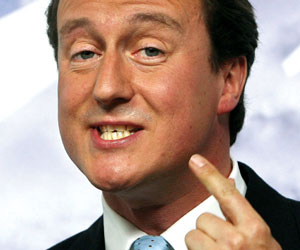 UK Prime Minister David “one is an ordinary bloke” Cameron has been claiming that ISPs are responsible for the deaths of fusilier Lee Rigby.
UK Prime Minister David “one is an ordinary bloke” Cameron has been claiming that ISPs are responsible for the deaths of fusilier Lee Rigby.
Responding to a report by the intelligence and security committee, Cameron said that internet companies are allowing their networks to be used to plot “murder and mayhem”.
He demanded that internet companies live up to their social responsibilities to report potential terror threats and said there was no reason for such firms to be willing to cooperate with state agencies over child abuse but not over combatting terrorism, or anything else that he might not happen to likethat week.
The parliamentary intelligence and security committee (ISC) concluded that the brutal murder of Rigby could have been prevented if a US internet company had passed on an online exchange in which one of the killers expressed “in the most graphic terms” his intention to carry out an Islamist jihadi attack.
However Cameron’s blaming the ISPs was probably more to cover up for the fact that the agencies had made a cock-up in their monitoring of Rigby’s murderers, Michael Adebolajo and Michael Adebowale. He focused on a comment which said that if MI5 had had access to the exchange between one of the killers, Adebowale, and an extremist overseas, Adebowale would have become a top surveillance priority. By failing to alert the authorities, the company had, “however unintentionally,” provided a “safe haven for terrorists.”
The report did say that MI6 and MI5 had made errors but that the murder would have happened even if the errors had not.
This is one of the problems – terrorists are darn hard to spot at the best of times and these two were known as self-starter terrorists, whose connection with other terrorist groups is slight. The report says the two men appeared between them in seven different agency investigations but were for the most part regarded as low-level subjects of interest.
“Adebolajo was a high priority for MI5 during two operations: they put significant effort into investigating him and employed a broad range of intrusive techniques. None of these revealed any evidence of attack planning,” the report said.
Adebowale was never more than a low-level subject of interest and the agencies took appropriate action based on the rigorous threshold set down in law: they had not received any intelligence that Adebowale was planning an attack and, based on that evidence, more intrusive action would not have been justified.
However Cameron said there was no possible justification for US internet providers not to inform agencies of terrorist activity since they already cancelled the accounts of suspected terrorists.
This summer, the government updated its legislation to require internet companies to cooperate with the state and report potential terrorist activity, but he said the level of cooperation was not satisfactory, mostly because of a reluctance for ISPs to be involved with what would be a police state.
Given that the ISP in this case was based in the US, it would have been incredibly unlikely that Cameron cracking down on UK ISPs would have made the slightest difference.
However, he admitted there was legal uncertainty about the duty of internet companies based in the US to cooperate with UK agencies due to conflicting laws in the US.
“There were errors in these operations, where processes were not followed, decisions not recorded, or delays encountered. However, we do not consider that any of these errors, taken individually, were significant enough to have made a difference,” the report says.





